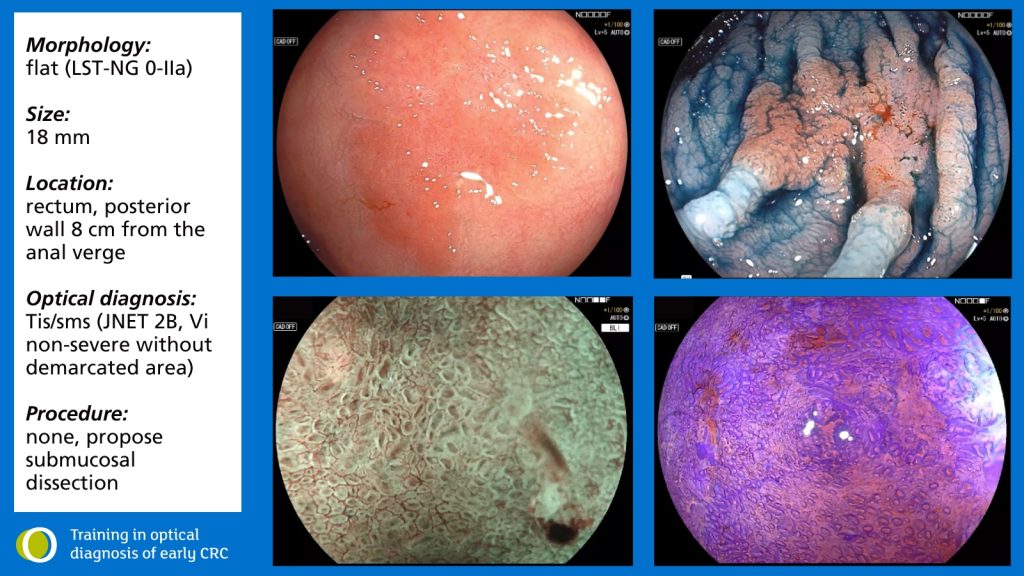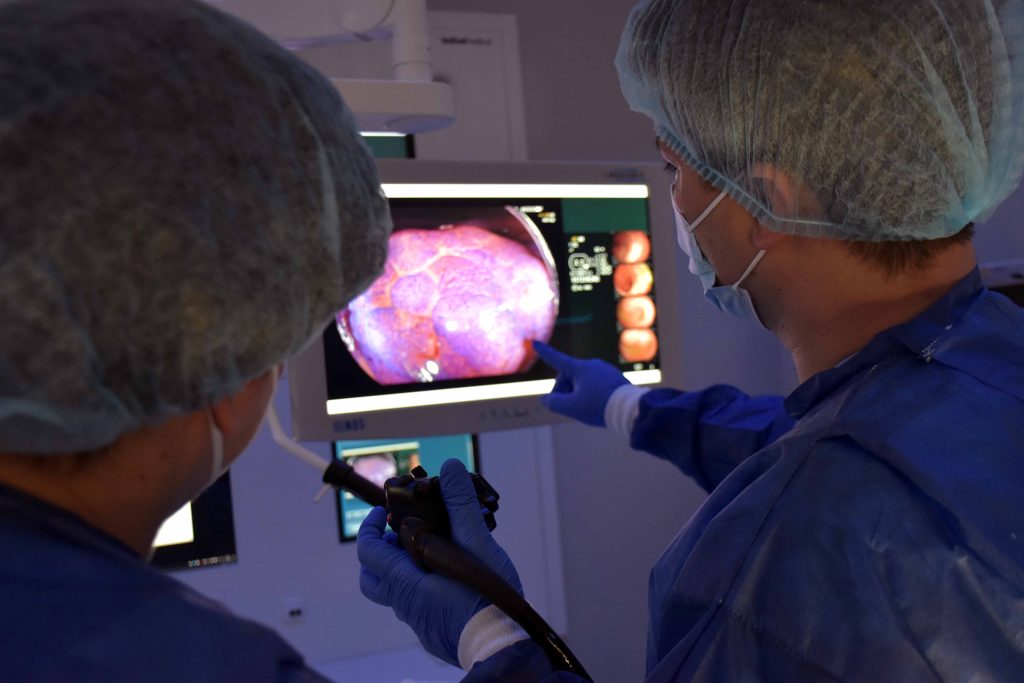Master Optical Diagnosis of Early Colorectal Cancer
Empower your practice with cutting-edge knowledge and practical expertise. Gain the knowledge you need to lead in optical diagnosis.
Don’t miss out—register today and secure your place.
Don’t miss it: you can now join the German edition of our training next February.

Why Optical Diagnosis Is the Future of Early Colorectal Cancer Care
Accurate detection means better decisions, fewer procedures, and improved outcomes.
Optical diagnosis is evolving rapidly—and mastering it is now essential for every GI endoscopist.
The Training in Optical Diagnosis of Early Colorectal Cancer (TOD Early CRC) equips you with the skills to:
The TOD Program: A Step-by-Step Solution for Optical Diagnosis
Mastering optical diagnosis starts with solid foundational knowledge. The TOD Early CRC program is designed to provide you with essential tools and a clear path to implement advanced diagnostic techniques in your clinical practice.
What You’ll Master: Techniques That Set You Apart
You’ll gain proficiency in the techniques that define modern endoscopy and lesion analysis:
Explore the Learning Path
The program is structured into 10 modules, each focused on building skills and knowledge that translate into better diagnostic outcomes.
Module 1: Decision-Making in the Treatment of Colorectal Polyps. Is There Room for Improvement?
Discover how to overcome the limitations of current clinical practice by avoiding unnecessary surgeries, optimizing endoscopic treatments and improving patient outcomes through more precise decision-making.
Module 2: Understanding the Pathologist’s Perspective
Learn to interpret histological slides, identify colon layers, and recognize risk factors for lymph node metastasis to ensure alignment with pathologists for better treatment strategies.
Module 3: Image-Enhanced Endoscopy
Master advanced imaging tools, including NBI, BLI, and dye-based chromoendoscopy, to systematically evaluate lesions and identify glandular crypts, pits, and vessels with confidence.
Module 4: The Assessment with White-Light Imaging
Understand how lesion size, location, morphology and gross malignant features correlate with the risk of submucosal invasion, applying the Paris and LST classifications for accurate evaluation.
Module 5: Dye-Based Chromoendoscopy with Indigo Carmine
Learn to precisely delimit lesion margins, confirm lesion morphology, identify demarcated areas and differentiate between polypoid and non-polypoid growths to improve your diagnostic accuracy.
Module 6: Virtual Chromoendoscopy Without Magnifying Endoscopy
Gain expertise in applying the NICE classification to assess lesion color, vascular patterns, and surface features, while combining these findings with white-light imaging for deeper insights.
Module 7: Virtual Chromoendoscopy With Magnifying Endoscopy
Learn to apply validated classifications like JNET to identify lesion types, predict histology, and make evidence-based decisions on treatment approaches, from piecemeal EMR to surgery.
Module 8: Dye-Based Chromoendoscopy With Crystal Violet and Magnifying Endoscopy
Master the assessment of the Kudo pit pattern using crystal violet staining to identify accurately invasive patterns such as V non-structural (Vn) and V irregular (Vi) in selected cases.
Module 9: Special Cases and Limitations
Understand the limitations of optical diagnosis and learn strategies to navigate challenging or complex cases effectively in your clinical practice.
Module 10: Summary of the Invasive Pattern
Develop a systematic approach to lesion characterization, confidently predict histology, and document your findings clearly in colonoscopy reports to support effective multidisciplinary decision-making.
Your Foundation for Optical Diagnosis Excellence
Gain the essential knowledge and proven techniques to confidently implement optical diagnosis in clinical practice—anytime, anywhere.
Modality: 100% virtual, on-demand
Language: English
But That’s Not All— When Knowledge Meets Real Clinical Practice
Move beyond theory. Engage directly with experts, analyze real cases, and elevate your clinical confidence.
| Clarify key concepts | Real clinical case discussions |
| Engage in group sessions to solidify your learning | Work one-on-one with experts on real cases |
| Participate in live, small-group discussions with expert endoscopists where you’ll revisit crucial aspects, resolve doubts, and strengthen your understanding of lesion decision-making, imaging techniques, and invasive patterns. | Share 3 real clinical lesions from your practice and discuss with an experienced faculty member findings, description in the colonoscopy report and treatment options. |
Why This Matters for Your Clinical Practice
Strengthen your skills with expert-led sessions that help you:
Is This Course Right for You?
If you are a medical professional committed to mastering optical diagnosis and improving patient care, this program is designed for you:
TOD Early CRC Training is the next step toward clinical excellence, giving you the tools and confidence to elevate your practice and improve patient outcomes.

What Our Participants Say
simply throughout the training,
allowing for a complete
understanding of
complex evidence.”
19/05/2024
The scientific evidence is clear regardless of whether we use high-definition or magnification endoscopes.”
02/03/2024
04/04/2024
covered in each block and the selection of material in the summaries; I think this
material is currently very useful
for my clinical practice.”
14/06/2023
structure, progressively increasing
diagnostic complexity; the clear concepts repeated to consolidate
knowledge; and the feedback sessions.”
7/06/2023
clearly commented and
explained adequately. The
Premium option meetings are
among the best training.”
29/09/2023
in small groups and with
a lot of tutoring. The topics covered are relevant and of progressive
complexity.”
27/08/2023
08/05/2023
20/04/2023
23/03/2023
Endorsed by Leading Medical Organizations
Recognized by the best in the field
This training program is backed by prestigious medical associations, ensuring the highest standards of quality and relevance.

Earn Internationally Recognized CME Credits
Advance your career with official accreditation
19.5 European CME Credits for completing the foundational training.
23 European CME Credits for participants advancing to the full program.
These credits are easily convertible to AMA PRA Category 1 Credits™, ensuring your efforts are recognized globally.
Take the Next Step in Your Career
Advance your expertise and bring precision to your clinical practice with the training option that fits your needs.

Basic
600 €

Premium
980 €
Frequently Asked Questions
What does each course option offer?
Both options give you access to the core training you need to master optical diagnosis.
- The Basic Course focuses on comprehensive theoretical knowledge and tools to implement optical diagnosis.
- The Full Program includes everything in the Basic Course, plus live group sessions to clarify concepts and discuss real clinical cases with experts.
How much time will I need to complete the course?
- The Basic Course can be completed in about 4–5 hours per week over one month.
- The Full Program has additional interactive sessions, so you may need slightly more time to attend and engage fully.
Do you offer a training package for hospital departments?
Yes. We offer an Institutional Premium Package designed for departments that want their endoscopists to train under a unified framework.
This package helps teams develop consistent criteria for optical diagnosis, improves MDT discussions, and supports higher-quality therapeutic decisions.
It includes up to eight Institutional Premium licenses, one-year access to all course content, and two live Q&A sessions with a Faculty member.
Are the live group sessions flexible?
Absolutely! The live sessions are offered on multiple dates and times to accommodate your schedule. You can also choose the language that suits you best: English, Spanish, or Portuguese.
Will I receive a certificate upon completion?
Yes, both courses provide a certificate of completion and are accredited for CME Credits:
- The Basic Course includes 19.5 European CME Credits (ECMEC®s).
- The Full Program offers 23 European CME Credits (ECMEC®s), providing additional recognition for the interactive sessions.
These credits are internationally recognized and easily convertible to AMA PRA Category 1 Credits™, ensuring your training is valued worldwide.
Can I switch to the Full Program after starting the Basic Course?
Yes, you can upgrade to the Full Program for €500 at any point during your 3-month access period.
Transform the Way You Diagnose. Change Lives.
Master the tools, techniques, and precision that set leaders apart in colorectal care.
This is your moment. Your expertise matters.
Bring optical diagnosis training to your entire department
If your unit wants to strengthen its expertise in chromoendoscopy, magnifying endoscopy, and the detection of the invasive pattern, our Institutional Premium Package provides everything needed to train together under a shared methodology.
It helps departments improve consistency in reporting, align therapeutic decisions, and accelerate the adoption of advanced imaging techniques.
Download the full package details now and see how your department can benefit.
